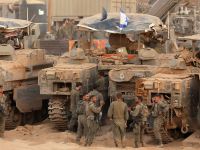Pope John Paul II has once again called for peace and forgiveness, this time in the rubble of Quneitra, a town destroyed by Israel in 1974.
The pope's visit to Quneitra, a once-thriving town on the much-disputed Golan Heights, comes a day after he became the first Roman Catholic leader to enter a mosque and pray in a Muslim place of worship, said CNN online.
It added that applause broke out on Monday as John Paul II entered a Greek Orthodox church that was, like the rest of Quneitra, in ruins.
The Israeli forces sacked the town before handing it back to Syria in 1974 under a UN-sponsored agreement.
Israel, which still holds most of the rest of the Golan, says Quneitra was damaged in fighting.
After a few moments of silent prayer, the pope, who is on a four-day visit to Syria, raised his head and, speaking into microphones, prayed aloud.
"We pray to you for the peoples of the Middle East. Help them to break down walls of hostility and division and to build together a world of justice and solidarity.
"May all believers find the courage to forgive one another so that the wounds of the past may be healed and not be a pretext for further suffering in the present," he added.
After his prayer, the pope emerged from the church to water a small olive tree -- a symbol of peace. After a short tour of the battered town, he returned to Damascus.
Syria has not rebuilt the town, but has left it as a memorial to Israeli atrocities until the entire Golan, occupied by Israel in the 1967 war, is back in Syrian hands.
The pope also stopped on Monday at the Church of St. Paul on the Wall. The shrine was built in the 1930s on the spot where St. Paul is said to have fled over the walls of Damascus in the first century to escape Jews angered at his passionate attempts to convert them to Christianity.
SYRIA REPEATS VERBAL ATTACK ON ISRAEL
Syria renewed its criticism of Israel on Monday, accusing the Jewish state of a long history of crimes against Palestinians and against sites sacred to Muslims and Christians, reported Reuters.
"The contemporary Zionists are the same as those Jews who were fought by Jesus Christ who in turn uncovered their hypocrisy and crimes," Khalaf Al Jarad, director general of the government daily Tishreen, wrote in a front-page editorial.
President Bashar Al Assad launched the campaign of harsh criticism of Israeli policies a month ago in a speech at an Arab summit in Jordan, in which he described Israelis who had voted for right-wing Israeli Prime Minister Ariel Sharon as more racist than the Nazis.
He repeated the condemnation of Israel during a visit to Spain last week and in a speech welcoming Pope John Paul on his arrival in Damascus on Saturday.
Assad's remarks, in which he accused Jews of betraying Jesus and the Prophet Mohammad, drew a sharp reaction from Israeli President Moshe Katsav, who said the Syrian leader was anti-Semitic.
Katsav implied Sunday that Assad would do much better to follow his late father's example by exercising more self-control in his criticism of Israel and the Jewish people, reported the Jerusalem Post.
"He [Hafez Assad] was not a partner with whom we could reach peace, but he did not express himself in such a careless, racist, anti-Semitic, illogical manner as that in which the current president expresses himself," Katsav said.
Assad's father, during his long rule of Syria, never allowed himself to make statements such as those which Bashar Assad made to Pope John Paul II, said Katsav, adding that he hoped the Vatican would correct Assad's historical inaccuracies.
The Syrians hope to promote the Arab issues during the Pope's four-day visit to Syria.
At least one Syrian serviceman was killed in an air raid on a radar post in Lebanon in April. The Syrians always remind the world of Israeli threats to wage a war against the Arab country.
Peace negotiations between the two foes froze in December 1999 as the two sides failed to reach an agreement on the Golan Heights, which was occupied by Israel in 1967.
Jarad, whose editorial was titled "The Murderers of Prophets and Children," accused the Israelis of a long history of massacres and other crimes against Palestinians.
"The Zionist occupation forces were committing a series of massacres, killings and shedding of blood of the innocent Palestinian people even before the establishment of the Zionist entity in 1948," he wrote.
"These forces also burned and destroyed houses, launched mass expulsion of Arab people, uprooted trees and slaughtered children without mercy," Jarad said.
He said the Jewish state had systematically "defiled" mosques, churches, hospitals and schools in occupied Arab land and Jerusalem, a city holy to Muslims, Christians and Jews.
Syria strongly condemned the election of Sharon, who is reviled in the Arab world for his role in Israel's 1982 invasion of Lebanon and the massacre of hundreds of Palestinians in the Sabra and Shatila refugee camps near Beirut by Israeli-backed Christian militias.
An independent Israeli enquiry found Sharon indirectly responsible for the massacre and forced him to resign from his job as defense minister in 1983.
Syria demands a total Israeli withdrawal from the strategic plateau.
"Those who want to see the racist and aggressive nature of the Haganah, Stern and Irgun (Jewish) gangs should observe the savage and criminal actions that are being committed daily by Sharon and his coalition government against the unarmed civilians, the women and children in Palestine, south Lebanon and the Golan," concluded Jarad's editorial.
The "gangs" were underground Jewish groups who fought Palestinians and troops of the British administration in Palestine in the period leading up to Israel's creation in 1948 - Albawaba.com
© 2001 Al Bawaba (www.albawaba.com)







